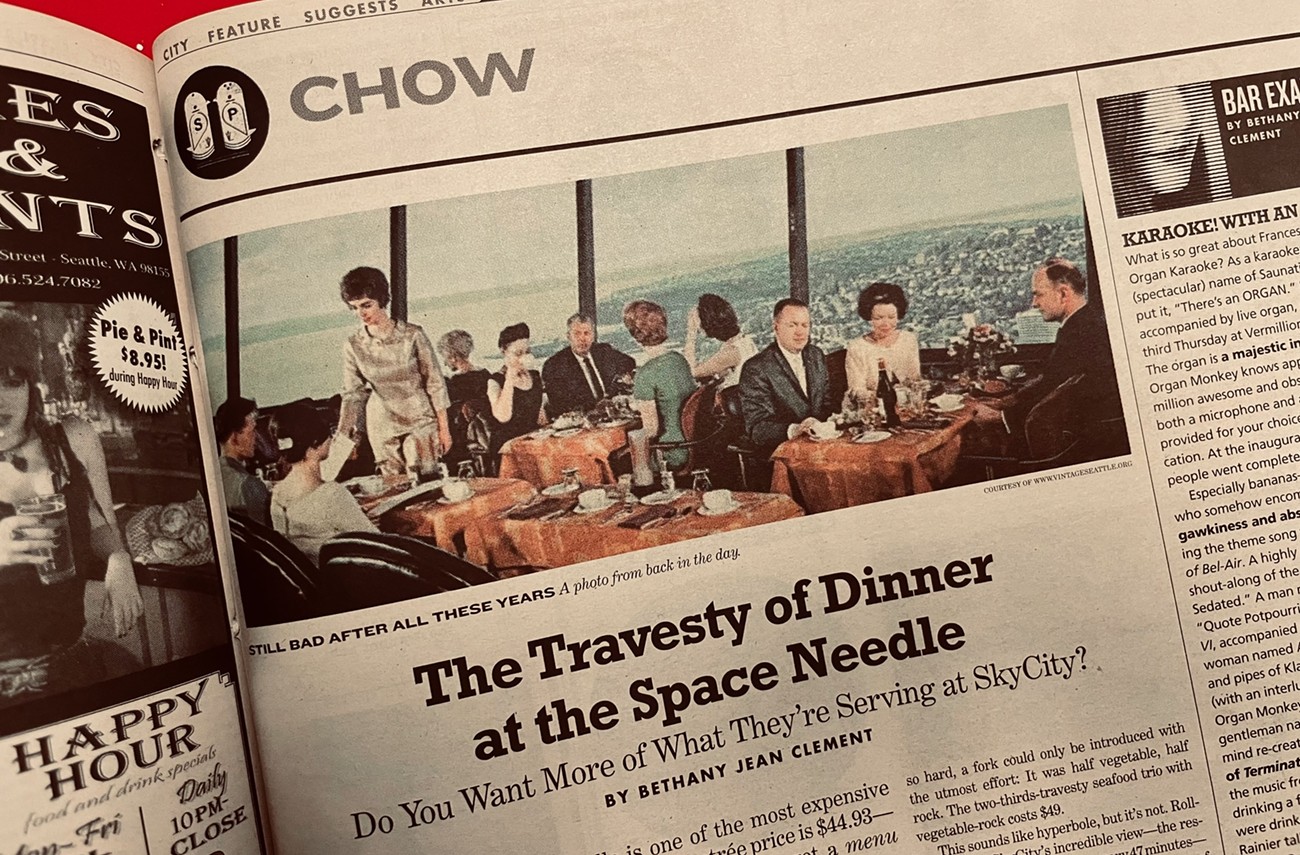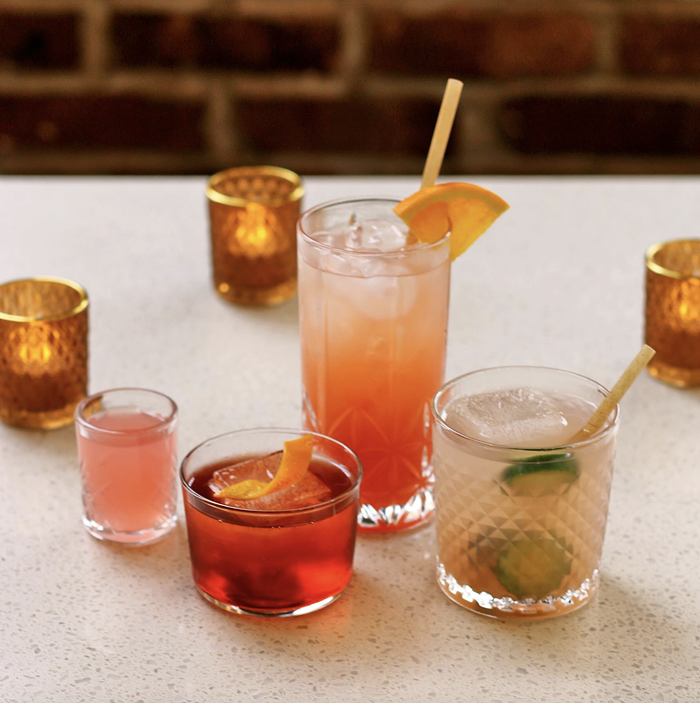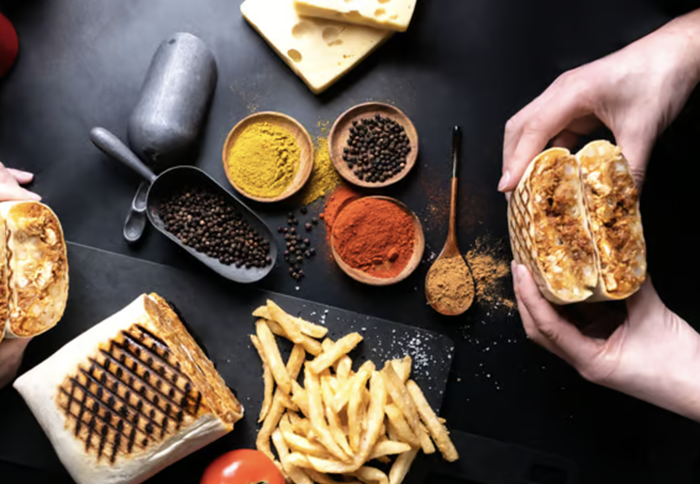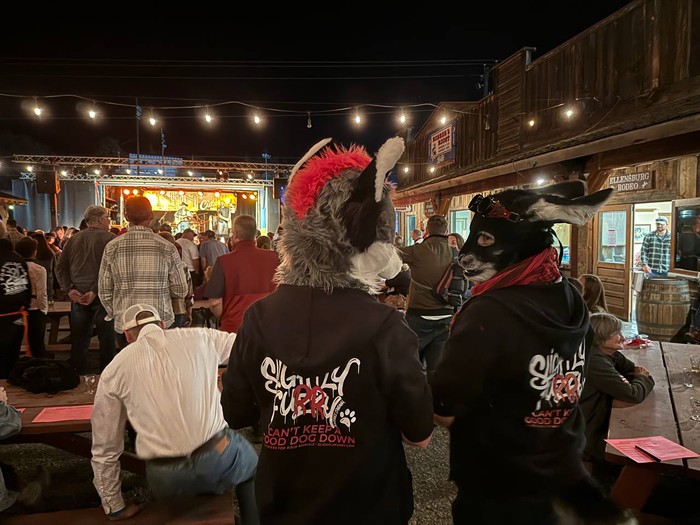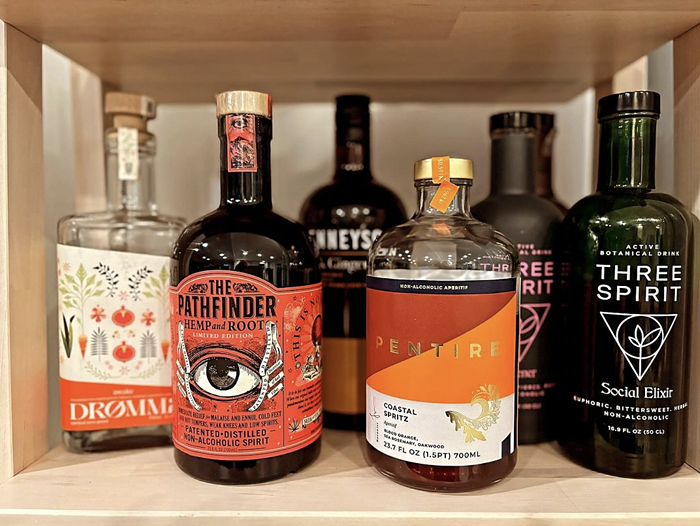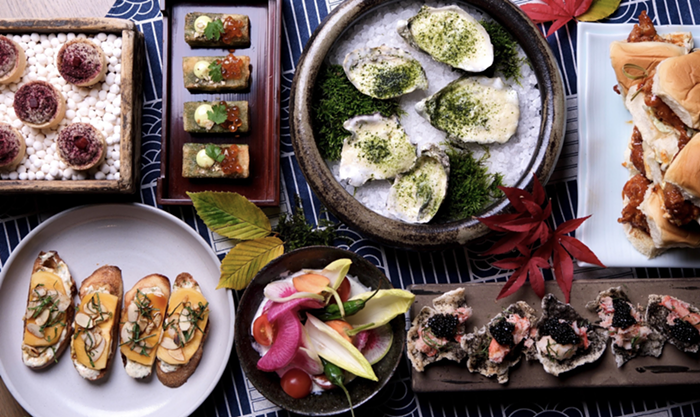SkyCity at the Space Needle is one of the most expensive restaurants in Seattle. The average entrée price is $44.93—to spend this much on the ground, you'll have to get a menu degustation at Rover's or put on a tie and go to Canlis. The $17 fee to go to the top of the Space Needle is waived for SkyCity diners, but if you think you can have a drink and an appetizer and rotate around enjoying the view, you're wrong: There's a minimum food and beverage charge of $35 per guest.
The first bite of crab cake has a piece of shell in it. This piece of shell will prove to be the strongest connection to the sea the crab cake can muster. The crab in the crab cake is in threads; no semblance of lump meat has made it into the cake, only shreds. It has a mushy texture. It looks like canned cat food, if Fancy Feast had a flavor with flecks of red bell pepper in it. It tastes like damp bread.
The crab cakes, two small ones, are lukewarm upon arrival, while some of the accompanying Wenatchee apple slaw is crunchy, some floppy. (The plate is hot, so the slaw under the crab cakes is inadvertently cooked. The plates are the only things that make it to the table hot.) Wenatchee is a place, not a kind of apple; many of the 90-million-plus boxes of apples produced in Washington's Yakima Valley every year spend some time in Wenatchee. The words "Wenatchee apple" hit a local/sustainable/organic note, while signifying very little. The crab cakes cost $17.
The Caesar salad is $9 (single digit!). It is of a familiar type: wetly white with salty, creamy dressing, strewn with indifferent croutons. Its acquaintance with lemon is distant, anchovy undetectable; if you replaced the thin slices of too-cold Parmesan with the pre-grated food-service variety, this Caesar would be at home at the Olive Garden.
The view—it's true—is amazing. If you haven't been up in the Space Needle recently (and if you live in Seattle, you haven't, because it costs $17), you've forgotten how our city looks in its entirety, the different-colored roofs and hidden sylvan courtyards of downtown, the neighborhoods stretching into the distance, the hills full of dollhouses, the toy ferries on the expanse of silver Sound, the mountains, the clouds. The mountains and the clouds: so beautiful, they seem artificial. This land is our land, and it is incredible, in the sense of difficult to completely believe.
What they do to a pork chop at SkyCity ought to be punishable by law. They start with "kurabuta" pork, or as the rest of the world spells it, kurobuta pork, which is purportedly cider-brined; this is difficult to detect after it's been cooked until gray and mealy and moistureless. If you've ever had kurobuta pork, or even just a good chop at a diner, this pork chop will cause grieving. It is barely warm; it sits in an unremittingly sweet pool of bourbon-maple sauce, sided with a mound of garlic mashed potatoes. Even the mashed potatoes are terrible—unrich, unsmooth, starch-tasting. A kitchen that can't be bothered to put enough butter and cream into mashed potatoes and then mash them enough is not trying. Next to them: a watery pile of string that is said to be roasted spaghetti squash. This is $39.
A trio of seafood was the least disappointing plate at SkyCity, being only two-thirds travesty. The scallops suffered a grilling that eradicated ocean-sweetness and tenderness, while grittiness was preserved; the wild salmon was also cooked very, very thoroughly, attaining a tinny taste. A couple of butterflied Gulf prawns, by contrast, were saved prior to desiccation—a rare instance of the kitchen knowing when to stop (or a random incidence?). The seafood trio's vegetables, however, included a brussels sprout so hard, a fork could only be introduced with the utmost effort: It was half vegetable, half rock. The two-thirds-travesty seafood trio with vegetable-rock costs $49.
This sounds like hyperbole, but it's not. Rolling around SkyCity's incredible view—the restaurant revolves 360 degrees every 47 minutes— while you eat a fancy dinner ought to be one of the best experiences of anyone's life. There are birthday parties, and children balance notes on the windowsill that circumnavigate and collect greetings ("Dear person reading, Hello! We are from Bellingham. Where are you from?" "RUSSIA." "Victoria." "Seattle—hi!"). The youngest, awkwardest couple ever sits gaping over a ribbon-tied gift bag and a bottle of sparkling cider in an ice bucket. A big group comes in, women and one girl—she looks around 11—with balloons and matching T-shirts. The shirts say "Make-A-Wish Foundation." This dinner at SkyCity is the thing this girl wants to do before she dies. She probably doesn't know how miraculous this dinner could taste, how much better this night of her life could be. She will be dazzled by the view, by the kind formality of the server, by the fog of the dry ice that pours over the table when she gets the famous Lunar Orbiter dessert, which besides the smoke and mirrors is a completely ordinary one-scoop ice cream sundae that costs $9.50. You sure as hell hope she doesn't know.
The Space Needle's restaurant has always been overpriced, and it has never been good, and everybody knows it. Its last review, 10 years ago in the Seattle Times, earned it "far from perfect." In 2009, according to Restaurants & Institutions, SkyCity's average diner spent $60, SkyCity served more than a quarter million meals, and SkyCity grossed $14.1 million. SkyCity doesn't care whether the food is good—they don't have to. It's not about the food, or the city, or anyone's dearest wish on this earth: It's about the money.
SkyCity's decor is corporate bland: The only thing that stands out is a large painting near the elevator that happens to be by Dale Chihuly. SkyCity's lengthy wine list is almost all Washington wines: Among the "Featured Space Needle Wines" are three with bottles featuring "a bold drawing by local artist, Dale Chihuly." The company that runs SkyCity and the Space Needle is the same one that wants to build the Chihuly museum that's been proposed for the Seattle Center near the Space Needle's base. Like the Space Needle, the Chihuly museum would be a for-profit business—one built on public land that the public would have to pay money to get into. The profits—like the profits of SkyCity—would go to the company that runs it, which is owned by the Wright family. Patriarch Jeffrey Wright has contributed more than $50,000 to conservative Republican candidates and causes over the past several years.
The restaurant at the Space Needle could be a marvel, a serious gourmet dining experience with the world's best view for the most special of special occasions—a source of civic pride. Instead, it's a rip-off and a joke, something the average Seattle citizen gets exactly nothing out of. We have no reason to believe the museum would be different. ![]()
